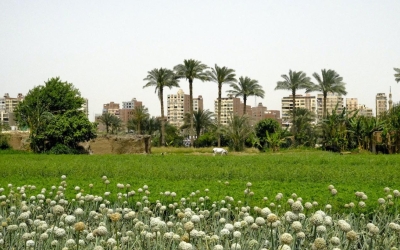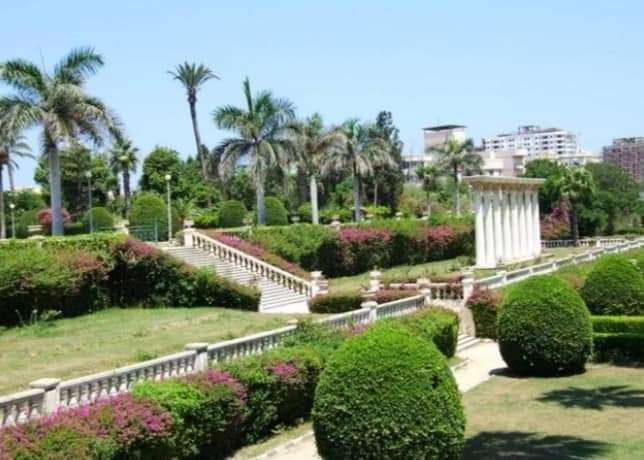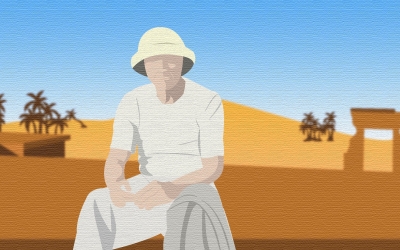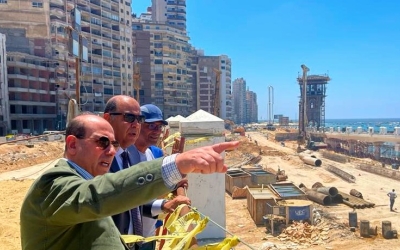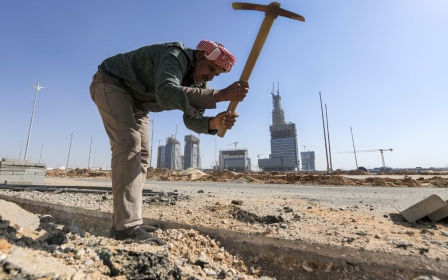Egypt: Fears of tree 'massacre' as bulldozers move into Alexandria's ancient garden
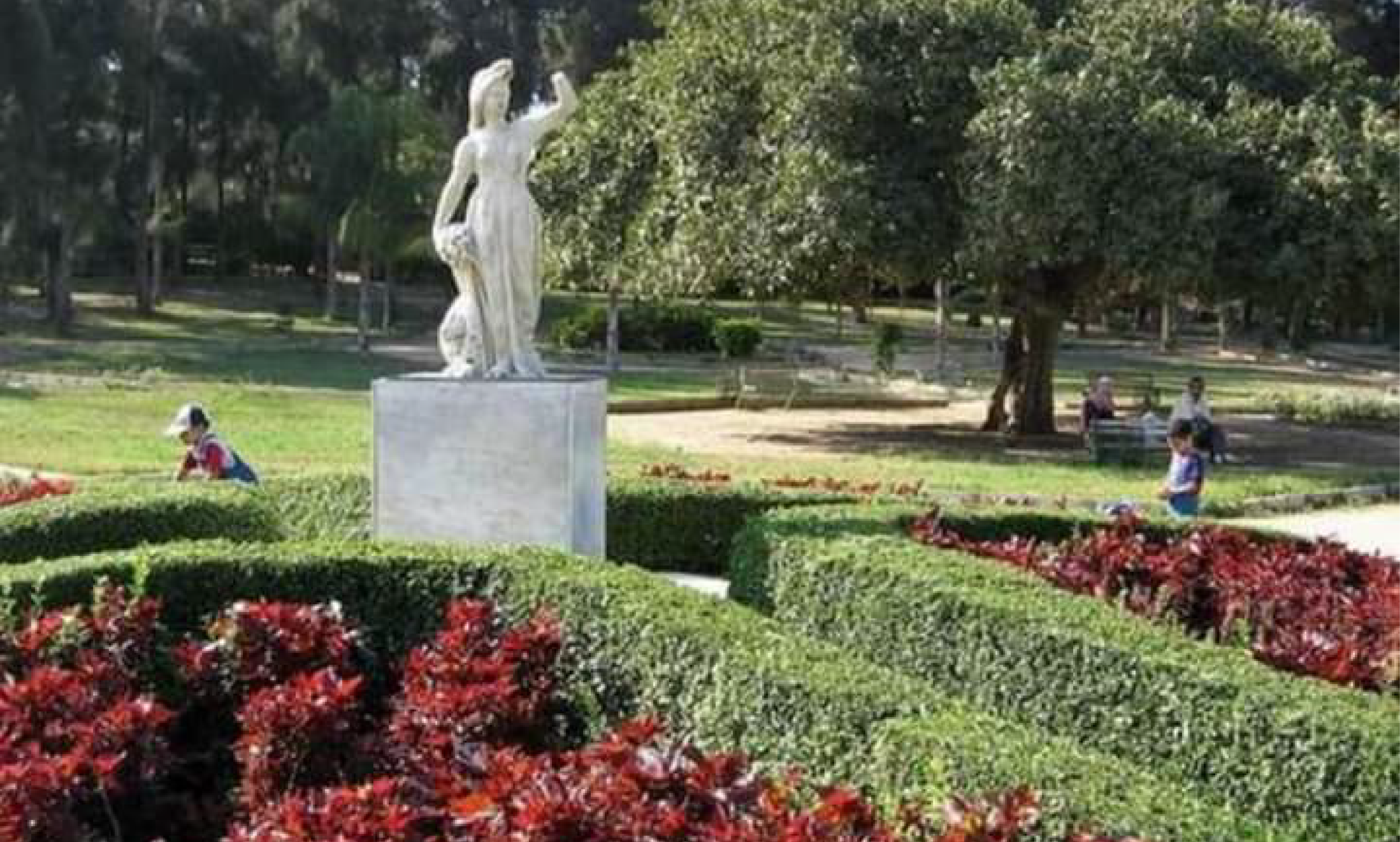
Municipal bulldozers are cutting through Antoniadis Gardens, a centuries-old site in the Egyptian Mediterranean city of Alexandria with trees and statues dating back to the Ptolemaic era. The works have prompted widespread fears of the possible uprooting of trees and a further infringement on public green spaces in the country.
Authorities in Alexandria have been quick to dispel fears about a possible demolition of the gardens.
Alexandria Governor Mohamed Sharif challenged those talking about a plan by the government to flatten the gardens.
"I challenge those who say that we are uprooting the trees of the gardens to prove this," the governor told a local television channel.
'The sorry thing is that "upgrade" as a term has become scary, especially in the context of historical sites'
- Soheir Hawass, National Organisation for Urbanisation
The governor also referred to a presidential directive for the overhaul of the gardens.
New MEE newsletter: Jerusalem Dispatch
Sign up to get the latest insights and analysis on Israel-Palestine, alongside Turkey Unpacked and other MEE newsletters
Gardens manager Badria Hassan said construction workers and equipment were in the gardens to upgrade and modernise them.
She claimed the trees of the gardens were being trimmed, a decaying fence reconstructed and some new features would be added to the place, including pools.
"We will preserve the history of the gardens, including their statues and rare trees and plants," Hassan said.
The presumed upgrade of the gardens is being carried out by one of Egypt's largest construction companies.
The company has brought its equipment to the area, including bulldozers, and deployed dozens of workers who are operating around the clock.
Confusion
There was some confusion, however, about the entity in charge of the project.
Soheir Hawass, a member of the state-run National Organisation for Urbanisation, criticised the authorities in Alexandria for not notifying her organisation, an affiliate of the Ministry of Culture, about the current works in the gardens.
The reasons for marginalising the organisation, which should supervise the demolition or overhaul of historical buildings in Egypt, can be traced in comments made by an unnamed assistant professor at the Agricultural Research Centre, an affiliate of the Ministry of Agriculture, to a local news outlet that the armed forces had taken possession of the gardens two weeks ago.
The armed forces, he said, had ordered employees to evacuate the administrative buildings of the gardens and also removed desks and files from these buildings.
"The trees of the gardens are significant because they represent different historical eras," Hawass told Middle East Eye. "The sorry thing is that 'upgrade' as a term has become scary, especially in the context of historical sites."
Meanwhile, historian Islam Asem said the absence of public information about the project had exacerbated public mistrust of the government.
"There are credible fears from current works in the gardens because of the lack of transparency on the part of the authorities," he told MEE. "This lack of transparency breeds little confidence in what they do anywhere."
Historic site
Antoniadis Gardens date back to the Ptolemaic era in Egypt and are considered the oldest in Alexandria.
They bore witness to many events connected with Ptolemaic rulers in Egypt.
In the early 19th century, the gardens' ownership moved to a wealthy Greek man and then to Muhammad Ali Pasha, the Albanian officer who represented the Ottoman sultan in Egypt and then established his own dynasty in the Arab country.
Egyptians, and especially the residents of Alexandria, consider the gardens a precious part of the city's history.
Now, however, the sight of bulldozers ripping through the gardens raises fears that the place is approaching its dramatic end.
"I feel so afraid of a possible demolition or blemishing of the gardens, given their important status in the history of Alexandria," Maged al-Rahib, head of the local lobby group Egyptian Heritage Rescue Foundation told MEE.
"The demolition of the gardens will be a great loss to the heritage of Alexandria."
Alexandria is Egypt's most famous city on the Mediterranean. The city, which dates back to the time of Alexander the Great, houses a huge number of landmarks and was a bustling centre of Greek and European communities in the past.
Antoniadis Gardens lie at the centre of these landmarks. Muhammad Ali Pasha chose the gardens to be the site of his new palace in Alexandria. In 1860, Khedive Ismail, a son of Muhammad Ali, asked a French artist to model the gardens on the gardens of the Palace of Versailles in Paris where Ismail spent time when he visited France.
Expansions ordered by Ismail increased the size of the gardens from 50 acres to over 70. The gardens currently cover 96 acres and are home to dozens of rare trees, especially palm trees. They also contain centuries-old statues.
Fears of destruction
Nevertheless, those passing by the gardens now can see nothing but scenes of destruction.
This is why some express fears that the work being done in the gardens will make them lose their allure or disfigure an important part of the heritage of Alexandria.
A man cited the example of another park that was modernised by the authorities in the Mediterranean city earlier.
Instead of preserving the park, he said, Alexandria authorities built a block of buildings on it.
Another man expected Antoniadis Gardens to be filled with shops, including ones that sold Egyptian street food.
"Does modernisation mean the cutting of trees?" he asked on Twitter.
Others blamed the authorities in Alexandria for neglecting the gardens for years, making it expensive to restore them to their original condition.
"Who is responsible for this?" a woman asked.
Some contents of the gardens have been ransacked, including a centuries-old statue whose head was smashed by a visitor earlier this year.
One commentator expressed hope that the authorities would leave the gardens as they are, signalling his fears that the overhaul would destroy them.
Previous demolitions
The Egyptian government has been under fire in the past months for uprooting trees and destroying important sites to make way for development projects.
A few weeks ago, the government was criticised for constructing a flyover and a footbridge inches away from the coast of Alexandria.
The authorities in Alexandria said the two projects were being undertaken to reduce overcrowding in the area.
However, environmentalists warned that the projects would be harmful to the coast of the Mediterranean city and cause additional pollution.
Environmentalists also lashed out at the government on several occasions for uprooting trees from streets in different areas, including in the eastern Cairo neighbourhood of Heliopolis, where road-widening is being undertaken.
Some people went as far as describing the cutting down of trees in different parts of Egypt as a "massacre of trees".
Egypt's Environment Minister Yasmine Fouad defended the cutting down of trees by saying that some of them had been planted in the wrong place.
However, she said any trees uprooted were being re-planted in other places.
Egypt is also carrying out a plan to plant 100m trees as part of a national afforestation campaign.
This all comes as Egypt prepares to host the 27th United Nations Climate Change Conference in the Red Sea resort of Sharm el-Sheikh in November this year.
Support for the project
Some of those living in Alexandria or with knowledge about Antoniadis Gardens support the current overhaul.
They say the gardens are badly in need of modernisation, having been neglected for many years.
This negligence, they said, turned the gardens into a centre of crime.
A woman said the gardens had started deteriorating in 2005.
"We used to visit them and enjoy their beauty," the woman wrote on Twitter.
"They then turned into a dreadful place."
Middle East Eye delivers independent and unrivalled coverage and analysis of the Middle East, North Africa and beyond. To learn more about republishing this content and the associated fees, please fill out this form. More about MEE can be found here.


